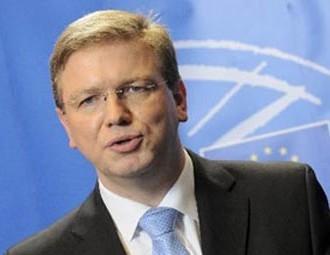Stefan Füle: EU values are at the core of the EaP and we will always defend them

European Commissioner for Enlargement and Neighbourhood Policy outlines priorities and challenges for the future.
The EU cannot ignore what is happening in its closest neighbourhood. Nor can it ignore that the people there look at Europe as a source of inspiration for reforms, European Commissioner for Enlargement and Neighbourhood Policy(ENP) Štefan Füle told the Annual Conference of Polish Ambassadors in a speech in Warsaw yesterday, looking at the priorities and future directions of the ENP.
“That is why it is so important for us to maintain our engagement in the Neighbourhood, focus on implementation and make sure that our offer meets their needs,” he added.
Commissioner Füle said the priority in the East was the success of the forthcoming Eastern Partnership Summit to be held in Vilnius in November, which, he said, “would mark a milestone and a ‘point of no return’ in anchoring our Eastern European partners to the European Union.”
In the South, he said the priority was a successful transition to sustainable democracy, highlighting that “this will require time, and the European Union must display both unrelenting support and ‘strategic patience’.”
The EU Commissioner stressed that funding for the ENP had been confirmed at the current levels for the next European Union Multiannual Financial Framework, despite the overall decrease of the EU budget, and that negotiations for the 2014-2020 European Neighbourhood Instrument regulation were nearing conclusion.
East
The main landmark event in the Eastern neighbourhood this year will be the Eastern Partnership Summit in Vilnius in November, said the Commissioner. “The Summit should highlight the achievements of Eastern Partnership over the last four years and determine the next steps for the period until the Summit in 2015”.
In view of providing the basis for initialling Association Agreements in Vilnius, negotiations with Moldova and Georgia, including on Deep and Comprehensive Free Trade Areas (DCFTA), have been completed, while with Armenia only small issues remain to be finalised, he said. Talks on an Association Agreement with Azerbaijan – without a DCFTA – are underway. The Commissioner also said that the EU is engaging regularly and intensely with Ukraine to ensure that there is a clear understanding of issues requiring further progress for signing of an Association Agreement at Vilnius.
Setting the agenda beyond Vilnius, the Commissioner outlined the areas of focus for the next two years: a stronger engagement with broader civil society, especially with young people and the business community; the development of the process of informal Eastern Partnership dialogues, starting with the next meeting in Yerevan in September, which will focus on education; supporting partners in the approximation process with the EU acquis, and promoting inclusiveness to prepare for the implement of the Association Agreements/DCFTAs.
“The most difficult issues to tackle are unsolved regional conflicts and serious human rights concerns in a number of countries, in particular in Belarus. Here let me recall the values of the European Union - namely liberty, democracy, respect for human rights and fundamental freedoms, and the rule of law. They are at the core of the Eastern Partnership. These are the shared values that we will always defend,” said Füle.
South
With regards to the changes that have been taking place since the 2011 ‘Arab spring’, Commissioner Füle recalled the EU’s response to these changes: “The European Union has been fully engaged in the transformation process in the region. It has mobilised significant additional resources, offered increased trade and market opportunities and stepped up its engagement with civil society – including through a new ENP Civil Society Facility and a new European Endowment for Democracy,” stressing that the impact and success of the EU’s policy largely depends on a common approach by the European Union and by all Member States but cannot work without the commitment of partners to reform.
The Commissioner said the situation in Egypt is “a matter of great concern” and that “it is of utmost importance that Egypt returns to the democratic process, including the holding of free and fair presidential and parliamentary elections and the approval of a constitution to be drafted in a fully inclusive and democratic manner”, calling for the release of all political detainees and the association of the main political forces in a national reconciliation effort.
On the conflict in Syria, Commissioner Füle recalled the EU comprehensive strategy that supports a political process that brings a sustainable solution, prevents regional destabilisation, addresses the humanitarian situation and mobilises an additional €400 million, bringing the total financial effort of the EU to €1.25 billion this year. “It is crucial now that these words are translated into actions to help the Syrian people,” said Füle.
In most other Southern partners, reforms are advancing slowly, according to the Commissioner who underlines, however, that with Morocco, DCFTA negotiations have been launched and a mobility partnership has been signed. “There are good prospects that we will start the same process with Tunisia. Tunisia offers good prospects of a successful democratic transition and the EU must remain engaged to support this country.”
At the regional level, the Commissioner expressed his hope that progress will be achieved in the Middle East Peace Process following the recent announcement of a return to direct peace talks. He also highlighted the four sectorial Ministerial meetings to be held until the end of the year, on the role of women, energy, trade and environment, and assured the EU’s determination to support closer cooperation and dialogue with the Maghreb countries.
According to EU Neighbourhood Info
-
03.01
-
07.10
-
22.09
-
17.08
-
12.08
-
30.09








































